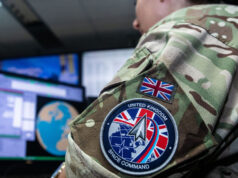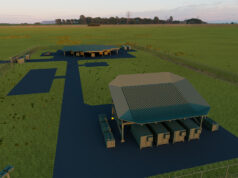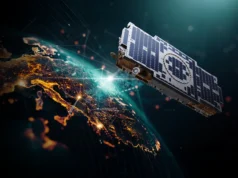A new report shows that 90% of business-critical data in the UK is delivered by foreign satellites.
The forthcoming report from space industry leaders, to be published next week, shows £270 billion of UK economic output is now dependent on data from non-UK satellites.
The authors raise fears over this level of dependency in an era of growing cyber attacks and the rising threat of ‘space war’ from hostile powers.
While government has announced a ‘National Cyber Force’ to improve Britain’s satellite defences, space industry figures warn the real problem is our dependency on space assets owned and operated by other countries. They urge the Prime Minister to build up the UK’s own sovereign capability in space in order to protect our economic resilience and recovery.
The new report, entitled, ‘Securing Our Future in Space,’ is being published next week by the UK’s space industry association, UKspace. It shows over 90% of the communications and data used to facilitate critical business activity in the UK comes via foreign satellites. This is despite satellites being designated as ‘critical national infrastructure’.
The key points, according to the authors, are as follows:
- The findings have already been discussed with government ministers and MPs. They contain independent analysis by former Bank of England economist, Steve Hughes, who suggests that more than £300bn of the UK’s business output is now enabled by satellite data, around £270bn of which comes from overseas.
- This dependency is increasing as the economy relies more and more on digital satellite services such as GPS, online business, email and mobile telephony: by 2030, the output dependent on satellites will reach at least £340bn, and the proportion dependent on overseas satellites to £306bn.
- The authors argue that while international cooperation on satellites data is positive, this huge level of dependency means the UK has very limited ability to protect the data assets our economy relies on from cyber attack and potential “space conflict”, where satellites are disabled or destroyed in orbit by hostile powers. We can only realistically expect to be able to protect a small proportion of UK-based satellites that provide critical data, although international strategic alliances such as NATO could help if effective co-ordination is achieved.
- The report estimates that even a short, temporary disruption resulting from such events would be catastrophic, leading to an “economic blackout” that would wreak havoc on business and essential public services.
- The report warns that the UK invests far too little on space compared to peer countries: the UK Space Agency has an annual budget of £500 million, around a third that of France’s equivalent, and less than half as much as Germany’s.
- The authors call on the Prime Minister to boost UK sovereign space capability, including via the establishment of a new body focused on national space procurement and by beefing up government’s capabilities to deliver space projects.
Nick Shave, Chair of UKspace, said:
“Data from satellites has become so critical to our everyday lives that even a temporary disruption would cause an economic blackout of frightening proportions. Building up our own national capabilities is essential for our security, and also an opportunity to create new jobs, driving a stronger recovery across the country.
The risk is that we could soon be permanently stuck as a ‘lower tier’ space faring nation, sleepwalking into greater and greater dependency on other countries for our economic security and as the fast growing global space economy, predicted to be a £400 billion sector by 2030, grows around us.”
Darren Jones MP, Chair of the BEIS Select Committee, said:
“The Prime Minister says he wants the UK to be a major space power, but the reality is very far from that and leaving EU space programmes will push us further away. Falling behind other nations on space leaves us with big concerns over economic resilience and cuts us off from a growing global space market worth hundreds of billions. I welcome this report and urge the Prime Minister to take action on its findings.”











And where is the backup infrastructure in the event of failure of our over-dependence on the internet?
Do you mean hard wired connections? There probably isn’t enough copper in the world!
That copper is (or was) already in the ground! And good old fashioned radio too! Isolated critical industries and utilities need to be stand alone and therefore managed on site. Centralising doesn’t permit that, but dial up and fixed circuits will still work providing it isn’t based on channels of broadband.
Cooper for fiber optics?
The internet is pretty resilient, with no single point of failure together with undersea cables, the internet is unlikely to fail.
The World Wide Web is a different matter
If only were will still in the EU then we would have our own GPS system, total nonsense report however the entire world relies on the same signals and they are controlled by our closest ally. Not exactly a reason to spend £5 billion on a third western system which we would then have to defend.
It would not be our own, it would be the EU’s.
Your last sentence – exactly.
But the first part says if we were in the EU
then we would be the EU.
The internet was created for resilience in the event of war, it is designed that way.
How ironic that we now consider resilience for our resilience.
Or, how ironic that our resilience became our primary means.
This is yet another example of what I have been banging on about in terms of the UK’s reliance on others for critical strategic assets and capabilities.
In many cases we have the companies in the UK to do something about this – but (when push-comes-to-shove) many are foreign-owned.
At least the Government seems now to be pushing the space sector, and we have the likes of Surrey Satellites and IMARSAT. To me it just needs a clear strategic decision to solve this problem, and the many other similar critical infrastructure and defence issues. It needs a dedicated and focused new UK organization that provides a framework, is properly funded (Sovereign Wealth fund etc.), and so generates a wider benefit to the UK economy and National security.
Yes but these days you only get the job if your friends with Boris’s woman….other wise we sell our defence companies abroad….
They are all basically clueless/naive. At least Cummings (love or hate him) had some sense of purpose and strategy. Looks like we are left with just the chumocracy.
I’m surprised it is that %
Going OT but still comms related, I understood most of the world’s communications and internet data went not by SATCOM but by undersea cables. The City of London routes through a place in Cornwall,for example, en route to the US.
The CLS ( Cable Landing Stations ) are also classed as CNI by both HMG and the USG.
I agree. There are some services that require delivery via satellite (e.g. gps) Otherwise traffic will go via undersea cables. I think this article gives the impression that most business critical traffic goes via satellite, rather than just the exception. It’s still important but a small fraction of all internet traffic, so is that also a small fraction of the £270 billion?
Yeah, that is a surprisingly high percentage although I suppose if you stop and think about it, its going to be driven by finance in the global economy and its something else that can be ‘outsourced’ to somewhere cheaper. Pretty scary really.
I’m sceptical by that report. 90% when the world’s internet backbone is via fibre optic traversing the world’s oceans. Hmmmmm
Agreed, lets watch the money.
It’s our soured to the USAF
Almost all financial transactions including ATM withdrawls use the time provided by GPS satellites because its free, available everywhere and hyper accurate. The UK could launch its own GPS system and they would all still use GPS as they all rely on a single standard. No doubt financial transactions in China use the same US GPS signal despite having their own. This report is nonsense.
Its not necessarily the cabling etc hut how it works to securely send data around it. Pretty much everything including the encryption that makes the internet work is dependent on everything knowing exactly what time it is. This is mostly done by using the gos time signal. Take that out and pretty much all our electronic comms fall over… this is one reason we need alternatives to gps. Not to find where you are but to know when you are.
The following gives an idea…
https://www.google.co.uk/amp/s/qz.com/1106064/the-entire-global-financial-system-depends-on-gps-and-its-shockingly-vulnerable-to-attack/amp/
Thanks Dave.
Why in the heck do the Brits still give contracts to the Chimcoms?????
It’s the same people with a naive mind-set that try to get China (!) to build UK nuclear power plants.
To be honest, I would be more concerned about an adversely taking down either Amazon’s or Microsoft’s Azure data centres in the U.K. While best practice for cloud computing is to have hot fail-over to another data centre in a different region there has been instances where this is has failed (the Microsoft fire-safety test a year ago in the US) or where the data has to reside in the same region (eg government security).
Take down Amazon Web Services or Microsoft Azure and that’s high street bank’s crippled, international financial trading, public utilities, together with a large number of U.K. corporations all impacted. Increasingly parts of local and central government would cease to function too.
From different people admittedly but it’s a bit jarring to me to read about this report critical of the UK’s lack of sovereign satellite data relay capacity shortly after reading a flurry of critical reports about the UK’s investment in OneWeb. Even ignoring the GPS aspect which may or may not turn out to be possible to do with the desired precision the existing OneWeb satellite constellation has already demonstrated a 400Mbps 32mS latency point-to-point connection although admittedly that was presumably without any contention (https://arstechnica.com/information-technology/2019/07/onewebs-low-earth-satellites-hit-400mbps-and-32ms-latency-in-new-test/).
In my view the UK’s OneWeb investment (and my guess is that it will probably need to invest another £0.5bn to £1.0bn more to complete the constellation/network) was a bold and exciting investment that, rather than simply addressing at least some of the data transfer part of the complaints reported here, has the potential to catapult the UK to a position that is virtually unique in the world in terms of having a sovereign-controlled high bandwidth low latency data network covering almost every square kilometre of the planet’s surface. As well as reducing businesses’ reliance on foreign satellite data links (and giving them better links than they currently have) imagine the benefits for the military. And on top of all that there’s also the ability for the UK to address the recently delayed-again aspiration to get broadband connectivity to the more isolated regions in the UK. It should be a very high national priority to double down on this OneWeb investment and make sure it delivers the full capability that it is possible to get from it.
On the GPS aspect if that turns out to be doable that would be the cherry on the cake albeit a very big cherry. Being in a much lower orbit the signals at ground level would be much stronger so less easy to jam and reception inside buildings would be better. Also with so many more satellites in the constellation it might be harder to kill the system by knocking out the satellites themselves.
Agree 110%
The radio frequency spectrum OneWeb has a licence for is better than SpaceX’s Starlink for bringing broadband to remote areas. Something which rural parts of the U.K. are crying out for.
Even before the OneWeb purchase, a private American company had determined it was possible to provide accurate GPS from cheap low-orbit satellites, rather than the traditional expensive geostationary approach.
Finally although OneWeb has an existing contract with ArianeSpace for launches, it’s conceivable that in future, satellites could be launched using Virgin Orbit operating out of Newquay. That would allow the rapid launch of replacements in any conflict where satellites are being knocked-out by an opponent.
But some people will still rubbish the purchase simply because it’s believed that Cummings was a proponent of it ?♂️